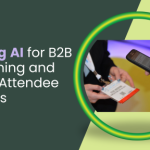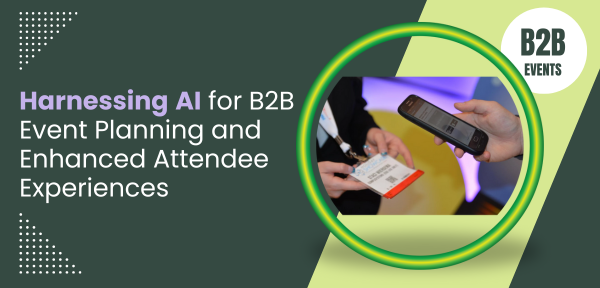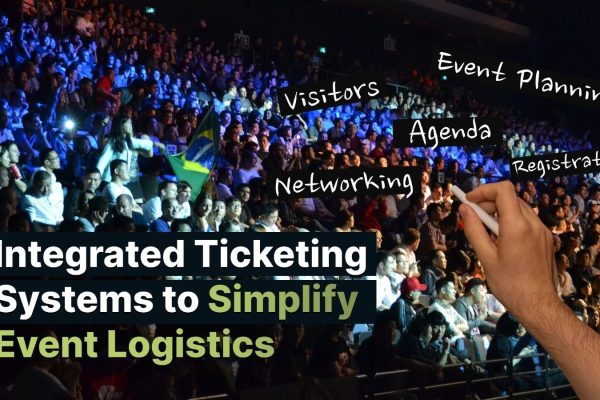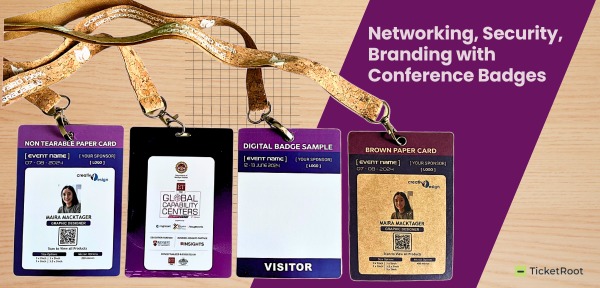Artificial Intelligence (AI) is changing the B2B event planning and engagement journeys, allowing businesses to plan smarter, more personalised, and more efficient events. By automating major tasks, offering personalised experiences to attendees, and providing valuable insights through real-time analytics, AI helps organisers create events that are not only memorable but also highly effective.
With advancements in AI tools, businesses can now manage their event logistics seamlessly, engage participants more effectively, and gain deeper insights into attendee behaviour. This blog will explore the role of AI in B2B event planning, how to integrate it into your event workflows, and key AI tools that can transform your events.
The Role of AI in B2B Event Planning
AI is becoming a game-changer in the B2B event space. According to a study by Event Manager Blog, 20% of event professionals are already using AI, and this number is expected to grow significantly over the next few years. The ability to leverage AI for automating tasks, personalising experiences, and analysing data in real time offers event planners a strategic advantage in delivering successful events.
In B2B event planning, AI plays three critical roles:
- Automation: AI can streamline and automate manual, repetitive tasks like scheduling, ticketing, and customer support, freeing up valuable time for event organisers to focus on higher-level strategy.
- Personalization: AI can tailor attendee experiences based on individual preferences, creating customised content, networking suggestions, and personalised event schedules.
- Data Analysis: AI-powered tools help organisers analyse large amounts of event data to understand attendee behaviour and measure the event’s success in real time.
How to Integrate AI Into Your Event Workflows
Successfully integrating AI into your event planning workflows can help reduce human error, increase efficiency, and ensure a more seamless experience for both organisers and attendees. Here’s a step-by-step guide to incorporating AI tools at every stage of the event process.
1. Automating Event Logistics
Managing event logistics can be time-consuming and prone to error, especially for large-scale B2B events. AI tools can help automate the process, streamlining everything from registration to scheduling.
Also read: Integrated Ticketing Systems to Simplify Event Logistics
AI-Powered Scheduling
AI-powered scheduling tools can optimize event agendas by analyzing factors like attendee preferences, speaker availability, and session popularity. These tools ensure that high-demand sessions don’t overlap, maximizing value for participants. Companies like Grip use AI to match attendees with relevant sessions and networking opportunities based on shared interests and industry data.
Smart Ticketing Systems
AI-enhanced ticketing platforms can dynamically adjust ticket prices based on demand, similar to how airlines and hotels manage pricing. They can also predict ticket sales and offer insights on attendee demographics, which helps planners make more informed marketing decisions.
Chatbots for Customer Support
AI-driven chatbots are revolutionizing customer support in event planning. These chatbots can handle attendee queries 24/7, offer guidance on registration, and even assist with event navigation in real time. This reduces the need for large customer service teams, especially during peak times, and ensures attendees have access to assistance throughout the event.
2. Personalising Attendee Experiences
One of AI’s biggest strengths in event planning is its ability to personalize the attendee experience. Personalized experiences lead to higher engagement, more meaningful connections, and increased satisfaction.
Tailored Event Content
AI algorithms analyze attendee profiles, preferences, and previous interactions to deliver customized content and session recommendations. For example, an AI tool may suggest specific breakout sessions or workshops based on the attendee’s role, industry, or interests, making the event more relevant and valuable.
Smart Networking Opportunities
AI tools can recommend networking opportunities by analysing attendee data and matching participants with shared interests or business goals. Tools like Hubilo and Grip use AI to recommend people attendees should meet, boosting the chances of meaningful connections. For example, Hubilo’s networking recommendation engine increased networking effectiveness at an event by 30%, according to case studies.
Post-Event Personalization
After the event, AI can continue to deliver value by personalising follow-up content, such as thank-you emails, personalised session summaries, and recommendations for future events. This helps extend the event’s engagement and provides continued value to attendees.
3. Enhancing Engagement with AI Tools
AI tools are also helping to improve engagement during events by providing real-time interactivity and delivering more immersive experiences.
AI-Driven Event Apps
Many event apps are now powered by AI, offering attendees personalized agendas, real-time session updates, and networking recommendations. AI in these apps can also help attendees navigate the event, offering session reminders and updates on changes in the agenda.
Voice Assistants and AI Hosts
AI-powered voice assistants and virtual hosts can enhance the event experience by providing real-time information, answering common questions, and guiding attendees through the venue. For example, IBM’s Watson AI has been used at events to power virtual hosts, answering attendee questions and offering session information.
Real-Time Analytics for Engagement
AI can help measure attendee engagement in real time by analyzing data such as social media activity, live polls, and feedback forms. This allows event organizers to make quick adjustments to the event as needed, ensuring a better experience for attendees. For instance, an AI tool could identify that a particular session is not engaging attendees, allowing the event team to take corrective action.
4. AI in Post-Event Analysis
Once the event is over, AI tools continue to deliver value by analyzing attendee feedback, engagement levels, and other key metrics to assess the event’s overall success.
Analysing Feedback and Behavior
AI tools can quickly analyse post-event surveys and feedback, providing deeper insights into attendee sentiment. These tools can identify trends in feedback, helping event planners understand what worked and what didn’t. AI can also track attendee behavior throughout the event, analysing which sessions had the most engagement and which networking opportunities were the most successful.
Predictive Analytics for Future Events
AI can use historical event data to offer predictive insights for future events. For example, AI might predict attendee turnout, popular session topics, and optimal ticket pricing for future events based on past behaviour and trends.
Key AI Tools for B2B Event Planning
Several AI tools are making waves in the event planning industry, helping to automate tasks, personalise experiences, and boost engagement. Here are a few key tools:
Grip: An AI-powered matchmaking platform that connects event attendees with relevant contacts and sessions based on shared interests and data insights.
Ticketroot powered by Premagic: TicketRoot, integrated with PreMagic’s AI tool stands out by offering smarter, automated solutions that streamline processes like personalised customer engagement, ticketing optimization, and event marketing insights
At a recent B2B exhibition, TicketRoot helped organisers increase check-in speed by 40%, thanks to its AI-powered ticketing system that optimised attendee flow in real time.
If you are an event organiser, looking to up your event’s efficiency and streamline your attendee’s experience, Ticketroot is your all in one solution.
Hubilo: A comprehensive event management platform that offers AI-driven networking recommendations, attendee engagement tools, and real-time analytics.
Stova: An AI-powered platform that helps manage event logistics, from registration to post-event follow-up. Stova offers personalized attendee experiences and real-time analytics for deeper engagement.
Run Smarter, More Engaging Events with AI
AI is no longer a futuristic concept; it’s a tool that’s already reshaping how B2B events are planned, managed, and executed. By leveraging AI, businesses can automate logistics, personalize attendee experiences, and analyze data in real time to improve engagement and ensure event success. With the right tools, event planners can create more efficient, engaging, and data-driven events that deliver significant ROI.
As AI technology continues to evolve, its role in event planning will only grow, offering more opportunities to create seamless, personalized, and engaging experiences for attendees.







